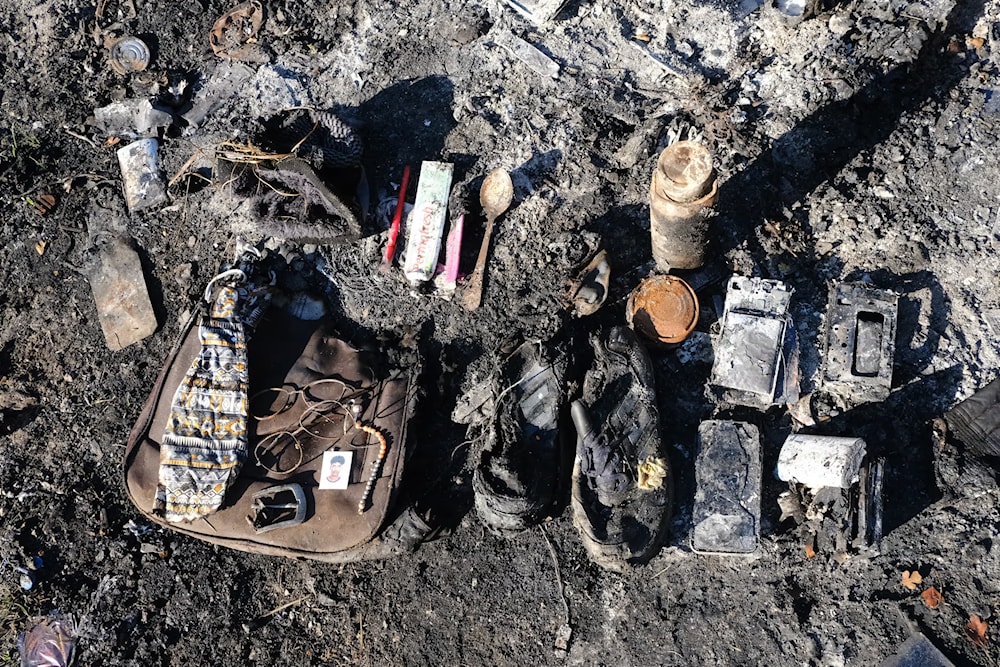Croatian police under fire for burning asylum seekers' credentials
A report shared with The Guardian by the humanitarian organization No Name Kitchen (NNK) reveals shocking evidence of brutality against migrants at EU borders.
-

Burnt clothing, backpacks, phones, passports, and other personal belongings photographed on the Croatian border (No Name Kitchen)
Croatia’s border police appear to be incinerating clothing, mobile phones, and passports confiscated from asylum seekers trying to enter the European Union, subsequently pushing them back to Bosnia, The Guardian reported on Thursday.
A report shared with The Guardian by the humanitarian organization No Name Kitchen (NNK) revealed shocking evidence of brutality against migrants at EU borders. The report includes photographs of burnt belongings, such as clothing and personal documents, alongside harrowing testimonies detailing sexual assaults and beatings inflicted by police.
Every day, thousands of individuals from South Asia, the Middle East, North Africa, and increasingly, China, attempt to traverse the Balkans in search of entry into the EU. There are limited facilities available, forcing many to endure the arduous journey in makeshift camps or train stations.
Dive deeper
Many individuals are halted by Croatian border police and subjected to searches, with reports of some being robbed and violently pushed back into Bosnia, where thousands of asylum seekers often face freezing temperatures.
These pushbacks appear to violate international law, which mandates that asylum seekers must be allowed to file their requests once they are within a country's borders.
No Name Kitchen (NNK) has identified eight large "burn piles" where Croatian police are accused of incinerating personal belongings and documents necessary for asylum applications in the EU. Additionally, burnt smartphones may hold evidence of abuses committed by Croatian police, including videos and photos captured by asylum seekers, according to NNK.
Pregnant Moroccan woman reports rape threats
At the end of 2023 and early 2024, No Name Kitchen (NNK) traveled to the Bosnia-Croatia border to find evidence of the burn piles mentioned in testimonies from individuals who had been pushed back. Previously, the organization had not verified these claims.
NNK identified locations known for pushbacks and documented various items, including ID cards, partially burned bags, hundreds of phones, shoes, glasses, official government documents, power banks, money, and other everyday objects that supported the testimonies.
In abandoned and crumbling warehouses in Sfax, young Sudanese adolescents are taking refuge as they await their journey to Italy. The organization also gathered testimonies of alleged violence perpetrated by border police.
In December 2023, a 23-year-old pregnant Moroccan woman reported that she was sexually assaulted by Croatian officers, who also burned her belongings along with items belonging to others in her group. She, along with her husband, another woman, and three minors, described how a border guard subjected her to an invasive strip search, including internal examination, while threatening to rape her.
The woman said, “The search was the worst thing to happen to me. I prefer he beat me than to search me in that way.”
After the group was released by the guards and fled back into Bosnia, the woman reported witnessing the officers burning their confiscated belongings.
In another account from November 2023, four Moroccan men said that they were beaten by police officers, who then set their possessions on fire. The police reportedly forced the men to walk barefoot over hot ashes while threatening them with batons. According to No Name Kitchen (NNK), one of the Moroccan men who provided this testimony suffered burns on the soles of his feet.
Pushback led to the death of a 6-year-old Afghan girl
Despite testimonies from aid workers and journalists, Croatia has consistently denied allegations of pushing back asylum seekers to Bosnia or using violence against them. NNK has recently submitted its evidence to the UN’s special rapporteur on torture.
Croatia’s interior ministry spokesperson stated that the country has a “zero-tolerance policy for any potential illegal activities committed by its personnel” and maintains an independent mechanism for overseeing police conduct.
In response to the testimonies from the pregnant woman and the group of four Moroccan men, the spokesperson remarked, “It is totally inconceivable that such an incident would occur without being reported to the police right away.” They stressed that violence and theft at the border were often perpetrated by people smugglers and noted that police had documented “many instances of fabricated claims.”
Regarding accusations that Croatian police are burning confiscated items, the spokesperson suggested that migrants sometimes destroy their belongings to avoid being returned to Croatia as applicants for international protection when attempting to cross the border illegally.
In 2019, after months of official denials, former Croatian president Kolinda Grabar-Kitarovic appeared to acknowledge the pushbacks in an interview with Swiss television. She admitted that police used force but denied that the pushbacks were illegal.
That same year, the European Court of Human Rights ruled that Croatian police were responsible for the death of a six-year-old Afghan girl, who was forced to return to Serbia with her family. They crossed train tracks and were struck and killed by a train.

 5 Min Read
5 Min Read








